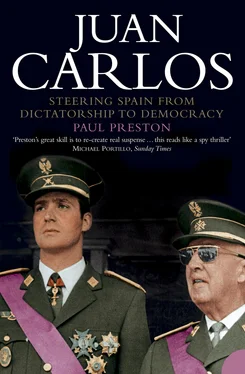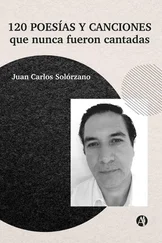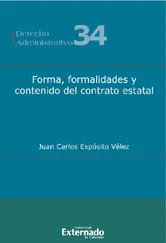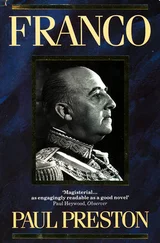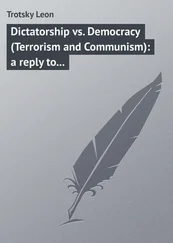Don Alfonso was buried in the cemetery at Cascais at midday on Saturday 31 March 1956. The funeral service was conducted by the Papal Nuncio to Portugal, and was attended by prominent Spanish monarchists and royal figures from several European countries. The desolate Don Juan could barely contain his distress, his eyes full of uncomprehending sorrow. Yet he greeted them all with grace and dignity. The Portuguese government was represented by the President of the Republic. In contrast, the Caudillo was represented merely by the Minister Plenipotentiary of the Spanish Embassy, Ignacio de Muguiro. The Ambassador, Franco’s brother Nicolás, was in bed, recovering from a car accident. 22 There were messages of sympathy from all over the world, including one each from General Franco and Doña Carmen Polo.
Juan Carlos attended in the uniform of a Zaragoza officer cadet. His look of vacant desolation masked his inner agony of guilt. After the ceremony, Don Juan took the pistol that had killed Alfonsito and threw it into the sea. There was considerable speculation about the gun’s origins. It has been variously claimed that the weapon had been a present to Alfonsito from Franco or from the Conde de los Andes, or that someone in the Zaragoza military academy had given it to Juan Carlos. The autobiography of Juan Carlos’s mother states discreetly that: The two brothers had brought from Madrid the small six-millimetre pistol and it has never been revealed who gave it to them.’ 23
Unable to support the presence of his elder son, Don Juan ordered Juan Carlos to return immediately to the Zaragoza academy. General Martínez Campos and Major Emilio García Conde arrived in a Spanish military aircraft in which the Prince was taken back to Zaragoza. The incident affected the Prince dramatically. The rather extrovert figure, so popular with his comrades in the academy for his participation in high jinks and chasing the local girls, now seemed afflicted by a tendency to introspection. Relations with his father were never the same again. Although he would return, superficially at least, to being a fun-loving young man, he was profoundly changed by the event. More alone than ever, he became morose and guarded in his speech and actions. 24
The death of her younger son profoundly affected Doña María de las Mercedes who fell into a deep depression, began to drink, and turned ever more for company to her friend Amalín López-Dóriga. Doña María was held partly responsible for the accident by her husband because she had given in to her sons’ repeated requests and allowed them to play with the gun despite their father’s prohibition. According to one such report, by the French journalist Françoise Laot on the basis of interviews with Doña María, she personally unlocked the secreter (writing bureau) where the gun was kept and handed it to Juan Carlos. Françoise Laot would later state that, 30 years after the accident, María de las Mercedes told her, ‘I have never been truly wretched except when my son died.’ 25 So affected was Doña María that she had to spend some time at a clinic near Frankfurt.
His personal devastation aside, the death of Alfonso significantly weakened the political position of Don Juan. Henceforth, he would be more dependent on the vagaries of the situation of Juan Carlos in Spain. In the words of Rafael Borràs, the distinguished publisher and author of a major biography of Don Juan, the death of Alfonso: ‘deprived the Conde de Barcelona, from the point of view of dynastic legitimacy, of a possible substitute in the event of the Príncipe de Asturias agreeing, against his father’s will, and outside the normal line of succession, to be General Franco’s successor within the terms of the Ley de Sucesión ’. Borràs speculates that, had Alfonso lived, his very existence might have conditioned the subsequent behaviour of Juan Carlos in the struggle between his father and Franco. 26
The Prince’s uncle, Don Jaime, endeavoured to derive political advantage from the tragedy. His first reaction had been to send a message of sympathy. However, on 17 April 1956 when the Italian newspaper II Settimo Giorno published an account of the accident which pointed the finger at Juan Carlos, he told his secretary Ramón de Alderete: ‘I am distraught to see the tragedy of Estoril dealt with in this way by a journalist who has been used in good faith, because I refuse to doubt the veracity of my unfortunate nephew’s version, as published by my brother. In this situation, and in my position as head of the Borbón family, I can only deeply disagree with the stance of my brother Juan who, in order to prevent future speculation, has neither demanded the opening of an official enquiry into the accident nor called for an autopsy on the body of my nephew, as is normal in such cases.’ These words were reproduced in the French press, presumably via Alderete and with the permission of Don Jaime.
Given that neither Don Juan nor Juan Carlos responded to Don Jaime’s demand, on 16 January 1957, he took the matter further and gave his secretary the following letter:
‘Reuil-Malmaison 16–1–1957.
Dear Ramón,
Several friends have recently confirmed that it was my nephew Juan Carlos who accidentally killed his brother Alfonso. This confirms something of which I have been certain ever since my brother Juan failed to sue those who had spoken publicly of this terrible situation. It obliges me to ask that you request in my name, when you feel that the time is right, that the appropriate national or international courts undertake a judicial enquiry in order to clarify officially the circumstances of the death of my nephew Alfonso (RIP). I demand that this judicial enquiry take place because it is my duty as Head of the House of Borbón, and because I cannot accept that someone who is incapable of accepting his own responsibilities should aspire to the throne of Spain. With a warm embrace.
Jaime de Borbón.’ 27
There is no evidence to suggest that Alderete acted on the letter or, if he did, that a court showed an interest in the case. Nevertheless, the combination of insensitivity and ambition demonstrated by Don Jaime was breathtaking.
The Madrid authorities were shaken by the news of the accident. Rumours started to circulate in the capital to the effect that Juan Carlos had been so overcome by grief that he was thinking of renouncing his rights to the throne and joining a friary as penance. In fact, as his father had ordered, Juan Carlos was back in Zaragoza within 48 hours of the accident. Franco’s relative silence on this issue was eloquent. Commenting on the tragedy to one of Don Juan’s supporters, he said with a total lack of sympathy ‘people do not like princes who are out of luck’. It was a recurrent theme. Two years later, he explained why he did not favour press references to Alfonsito: )‘The memory could cast shadows over his brother for the accident and make simple folk dwell on the bad luck of the family when people like their Princes to have lucky stars.’ 28 Perhaps most cruelly of all, within a year of the accident, Franco had permitted the Ministry of Education to sanction the publication and use in secondary schools of a textbook entitled La moral católica (Catholic Morality) which used the incident to explore the limits of personal culpability. 29 Years later, Don Juan himself related that, when they met in 1960, Franco had justified keeping him off the throne by saying that the Borbón family was doomed: ‘Just look at yourself, Your Highness: two haemophiliac brothers; another deaf and dumb; one daughter blind; one son shot dead. Such an accumulation of disasters in a single family is not something that could possibly appeal to the Spanish people.’ 30
Franco’s lack of sympathy was a reflection of his hostility to Don Juan, of his own lack of humanity and perhaps too of the fact that, in March 1956, he was cooling on the idea of a monarchist succession. The scale of Falangist discontent that had been evident since the meeting at Las Cabezas seems to have led to him mulling over the mutual dependence between Caudillo and single party. This was manifested in the cabinet reshuffle of 16 February 1956. The liberal Christian Democrat Minister of Education, Joaquín Ruiz Giménez, was dropped, a punishment for his failure to control unrest in the universities. He was replaced by a conservative Falangist academic, Jesús Rubio García-Mina. Raimundo Fernández Cuesta, the Secretary-General of the Movimiento , was also removed for his failure to control Falangist indiscipline. He had been engaged in preparations to tighten up the Francoist laws lest any future king try to free himself from the ideals of the Movimiento . He was replaced by the sycophantic Falangist zealot, José Luis de Arrese. Alarmingly, for both Don Juan and for those who were looking forward to the eventual creation of a Francoist monarchy, the Caudillo commissioned Arrese to take over the programme of constitutional preparations for the post-Franco future. 31
Читать дальше
